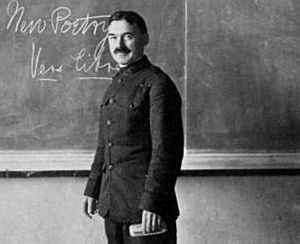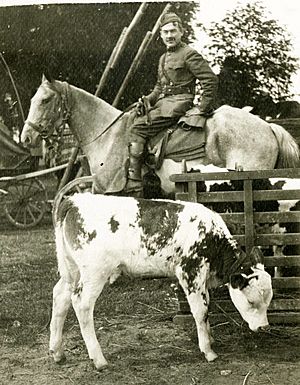Robert T. Kerlin facts for kids
Quick facts for kids
Robert T. Kerlin
|
|
|---|---|

Kerlin in 1918 at the Virginia Military Institute
|
|
| Born | March 22, 1866 |
| Died | February 21, 1950 (aged 83) |
| Known for | Civil rights activism, socialist activism, English teaching |
Robert Thomas Kerlin (born March 22, 1866 – died February 21, 1950) was an American teacher, minister, and a champion for civil rights. He wrote several books and put together collections of writings. These included The Voice of the Negro (1920) and Negro Poets and Their Poems (1923). Kerlin taught English at many schools. He was even fired from three jobs because he spoke up for what he believed was right.
Contents
Early Life and Education
Robert Thomas Kerlin was born on March 22, 1866. His parents, John Lindsay Kerlin and Nancy Jeffries Kerlin, lived in Newcastle, Missouri. His family had once owned a slave.
Kerlin went to college at Central College in Missouri. He then studied at Johns Hopkins University, the University of Chicago, and Harvard University. He earned his PhD from Yale University. Kerlin also spent some time living outside the United States. He was a member of the Quaker religious group. In 1907, he married Adeline Koster Kerlin, and they had three daughters.
Teaching and Ministry
In 1890, Kerlin began teaching English at Missouri Valley College. He taught there for four years. After that, he left to become a minister in the Methodist Episcopal Church, South.
He served as a minister until 1898. That year, he became a chaplain (a minister for soldiers) during the Spanish–American War. He went with the Third Missouri Volunteers. When the war ended, he went back to teaching English.
Working at Different Schools
Over the next decade, Kerlin taught at several schools. These included Missouri Valley College (1901–1902) and Southwestern University (1902–1903). He also taught at State Normal School at Warrensburg, Missouri (1903–1906). From 1906 to 1907, he was an instructor at Yale University. He then taught at State Normal School at Farmville (1908–1910). During 1906 and 1907, he was also an editor for The Arena magazine.
Civil Rights Activism
Kerlin was a member of the NAACP. This group works to ensure equal rights for all people. In 1910, he started teaching English at the Virginia Military Institute.
While teaching there, he published The Voice of the Negro in 1920. This book was a collection of writings from African-American newspapers. It focused on the events of the Red Summer, a time of racial violence. After World War I ended, Kerlin taught at the American Expeditionary Forces University. He also edited Negro Poets and Their Poems, a collection of poetry, in 1923.

Speaking Out for Justice
In 1921, Kerlin wrote an open letter to Thomas C. McRae. McRae was the Governor of Arkansas at the time. Kerlin asked the governor to look again at the cases of several Black farmers. These farmers had been sentenced to death after the Elaine massacre. The farmers were accused of starting the riot. However, Kerlin argued they had acted to defend themselves. He wrote that the world would one day be shocked by such unfair treatment.
After his letter was published in The Nation magazine, the leaders of Virginia Military Institute asked Kerlin to resign. He refused to quit, so the school fired him.
Continued Activism and Later Life
After being fired, Kerlin found work as a lecturer. In 1922, he started teaching at West Chester University in Pennsylvania. He soon joined the American Federation of Teachers (CIO), a union for teachers. From 1922 to 1927, he also taught for short periods at other schools. These included the Philadelphia Labor College, Lincoln University, and Western Maryland College.
After five years, Kerlin was fired from West Chester University. The reason given was that he was "too friendly with Negroes" and had "radical views" about society. Kerlin wrote in The Reading Times newspaper that he was fired for criticizing President Calvin Coolidge. He then got a job teaching at Potomac State College in West Virginia. Eventually, he had to retire from this job for similar reasons related to his views. After retiring, Kerlin moved to Cumberland, Maryland.
In 1943, Kerlin began editing the CIO's news for western Maryland. He did this for three years. During World War II, he taught at the Cumberland Labor College, which he had also started. Kerlin helped create Cumberland's chapter of the Progressive Citizens of America. This was a socialist political group. He was also its first chairman in September 1947. He left the group the next year when it supported Henry A. Wallace for president in 1948. That same year, Kerlin was nominated by the Socialist Party of America to be part of the United States Electoral College.
Kerlin continued his activism by protesting movie theaters in Cumberland. He picketed them to protest against segregation, where Black and white people had to sit in separate sections. He especially protested when the film Pinky was released in 1949. The Journal of Negro History suggested that his activism at an old age might have affected his health. Robert T. Kerlin died on February 21, 1950, in Cumberland, Maryland, from a heart attack.
Writings
- Mainly for Myself (1897)
- The Camp Life of the Third Regiment (1898)
- The Church of the Fathers (1901)
- Theocritus in English Literature (1909)
- Milton's Minor Poems (editor)
- The Voice of the Negro (1920, editor)
- Contemporary Poetry of the Negro (1921, editor)
- Negro Poets and Their Poems (1923, editor)

